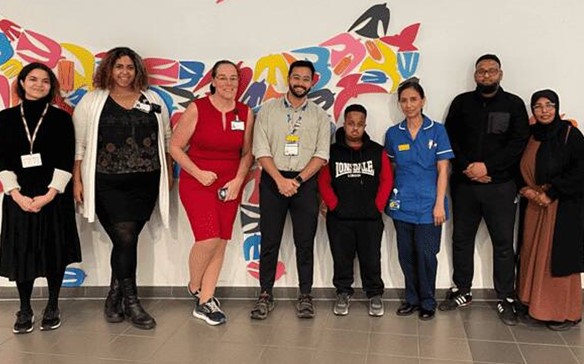Hospital beds freed up by better monitoring

16 Jan 2024
Full story
The Whittington Health Outpatient Parenteral Antibiotic Therapy (OPAT) service has made it possible for patients on complex antibiotic-resistant infections to be treated safely at home. Since May 2023, the Whittington OPAT service, supported by a new electronic dashboard developed in-house, has helped improve Emergency Department waiting times, hospital discharge rates and freed up a staggering 800 bed-days for patients with complex conditions.
The OPAT multidisciplinary team comprises of specialists doctors, clinical pharmacists and nurses who work alongside community care providers and ward clinicians to look after patients with deep-seated, complex infections. These patients are well enough to leave hospital, but still need intravenous or complex anti-infectives with regular clinical monitoring. Whittington OPAT treats patients with complex infections involving prosthetic joints, heart valves and bloodstream infections. Patients are monitored digitally and are treated at home using antibiotic infusions, supported by community nurses, pharmacists and paramedics.
Each week the team meets to discuss all patients being treated at home, including those being supported by district nurses, virtual wards or self-administering their own intravenous antibiotics
The OPAT team has developed an in-house information dashboard that gives clinical staff up-to-date information on treatment and patientís status at their fingertips with just a click, directly linked to the patientís medical records. The OPAT dashboard is valuable for vulnerable adults, especially those with disabilities or from minority ethnic backgrounds. People in these groups sometimes face difficulties in getting the care they need. The dashboard connects patient outcomes with their background information, giving the team a better understanding of the challenges the patient might encounter in accessing healthcare.
Ibrahimís Story
Ibrahim, pictured with his parents and the OPAT team, was born with Pycnodysostosis, a rare genetic disease which can lead to people having brittle bones. In December, 2022 Ibrahim suffered a leg fracture which required complex surgery at a local Trust involving the insertion of prosthetic metalwork. Post-operatively, this developed a "superbug" infection with antibiotic resistant bacteria which required several months of treatment. Oral antibiotics were ineffective and there were very limited intravenous options. Once Ibrahim was in a stable condition, the Trust asked Whittington OPAT to support Ibrahimís hospital discharge on intravenous antibiotics.
The OPAT team trained Ibrahimís family to administer these safely at home to control the infection before surgeons could remove the infected prosthesis. For three months, Ibrahim continued the intravenous antibiotics at home, supported by weekly blood tests and appointments. Once the infection had been suppressed enough, Ibrahim underwent his final surgery to remove the infected prosthesis.
Now living happily at home with strong family support, Ibrahim walks pain-free and has returned to school. His hobbies include playing Minecraft and Crash Bandicoot on PS4 and Nintendo Switch.
His mother said: ďWhen we first came to Whittington to learn how to administer intravenous antibiotics, we were scared of how the future would pan out. We had never done anything like this before. The OPAT team were so supportive and helped us navigate through very difficult times. We were pleased Ibrahim was able to spend those months in the comfort of his own home, while he was treated with complex antibiotics. We hope his story can help anyone else going through similar difficulties.Ē

